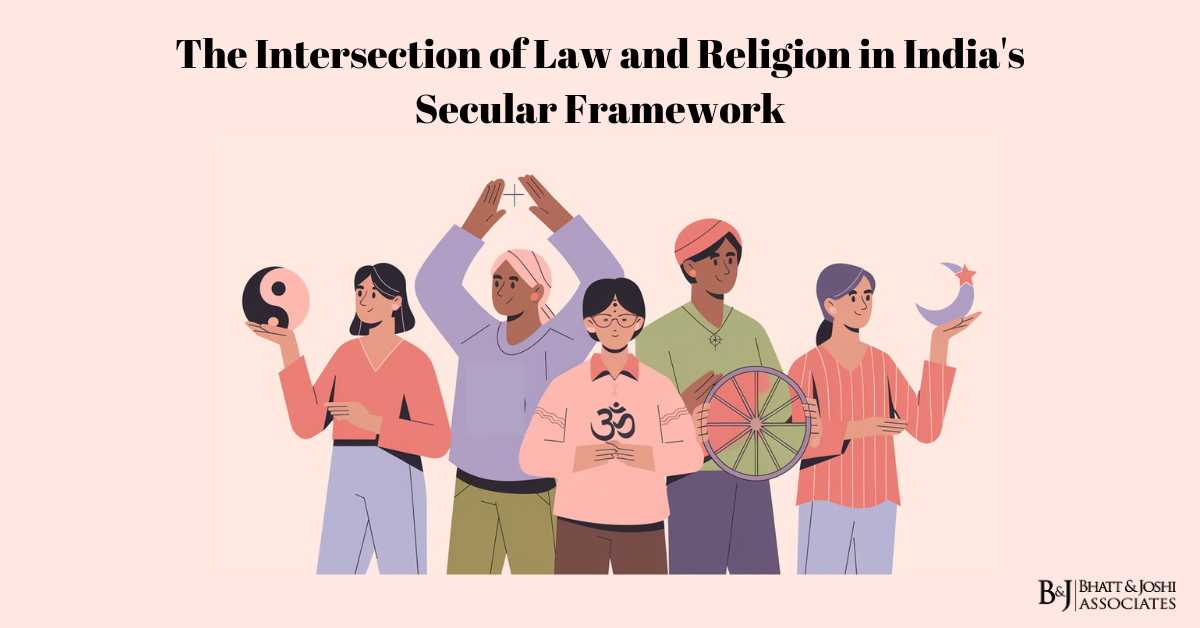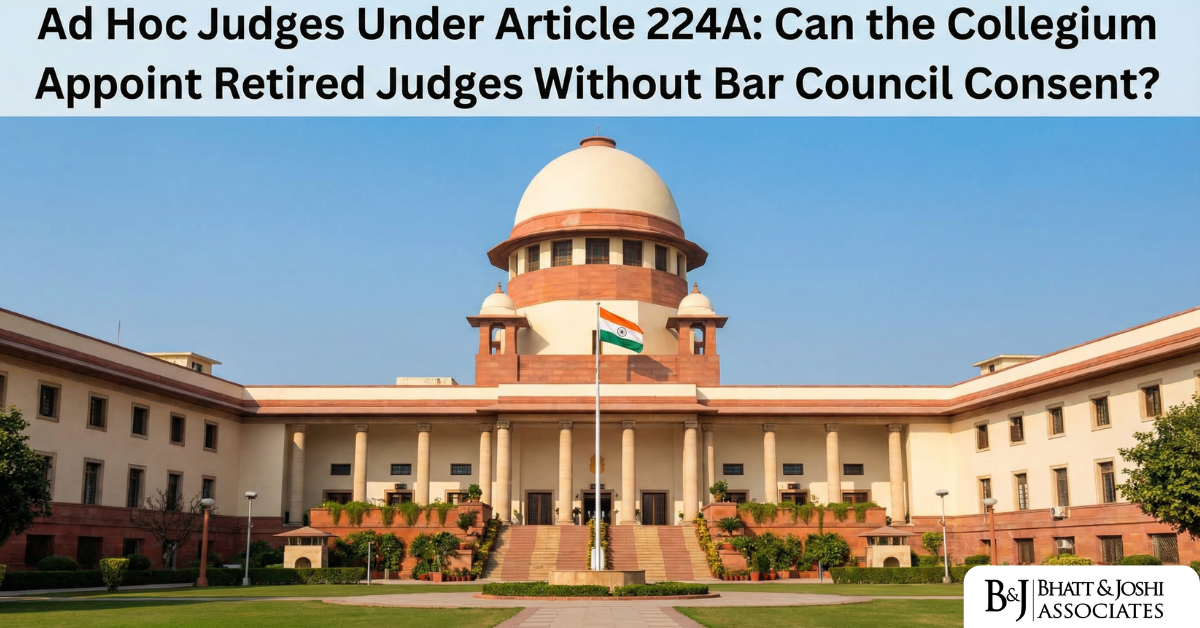India’s Secular Framework: The Intersection of Law and Religion
Introduction
India, as a nation, is celebrated for its unparalleled diversity, where multiple religions coexist, each contributing to the vibrant cultural mosaic. At the heart of this coexistence lies India’s secular framework, a system uniquely adapted to its pluralistic society. Unlike the Western notion of secularism, which strictly separates religion and state, the Indian model is more accommodative, allowing space for religious expression while ensuring that the state remains neutral. This nuanced approach underpins the complex intersection of law and religion in India, shaped by historical developments, constitutional principles, legislative frameworks, and judicial interpretations. Understanding this interplay is essential to appreciating India’s democratic ethos and the challenges it faces in harmonizing religious diversity with constitutional values.
Historical Foundations of Secularism in India
The roots of secularism in India can be traced to its ancient and medieval history, where a tradition of religious tolerance and coexistence existed long before the modern concept of secularism emerged. Ancient Indian texts and practices often advocated respect for diverse faiths, and rulers like Ashoka promoted religious harmony. In the medieval period, Akbar’s policy of Sulh-i-Kul (universal peace) exemplified efforts to bridge religious divides.
Colonial rule introduced new dynamics to this pluralistic tradition. The British, while proclaiming neutrality, often adopted a policy of non-interference in religious matters to avoid antagonizing communities. However, this approach inadvertently institutionalized divisions by codifying personal laws based on religious customs. The colonial legacy left India with a legal framework that respected religious autonomy but also created tensions between community-specific laws and the emerging ideas of equality and justice.
Post-independence, the framers of the Indian Constitution faced the daunting task of integrating this historical legacy into a modern democratic framework. They sought to create a secular state that would mediate conflicts, ensure equality, and respect religious freedoms. The result was a distinctive model of secularism that balances the protection of individual rights with the accommodation of religious diversity.
Constitutional Framework and Religious Freedom
The Indian Constitution embodies the principle of secularism in its Preamble, which declares India to be a “sovereign, socialist, secular, democratic republic.” This declaration sets the tone for the constitutional provisions that seek to balance individual freedoms with societal interests. Articles 25 to 28 are particularly significant in delineating the scope of religious freedom and the state’s role in regulating it.
Article 25 guarantees the freedom of conscience and the right to profess, practice, and propagate religion. However, this right is not absolute; it is subject to public order, morality, and health, as well as to other fundamental rights. The state is also empowered to regulate or restrict any economic, financial, political, or other secular activity associated with religious practices.
Article 26 grants religious denominations the freedom to manage their own affairs in matters of religion, establish and maintain institutions, and own and administer property. This provision underscores the autonomy of religious communities while also subjecting them to state regulation in matters of public interest.
Article 27 prohibits the imposition of taxes for the promotion of any religion, reflecting the principle of state neutrality. Similarly, Article 28 restricts religious instruction in state-funded educational institutions, ensuring that public education remains secular.
These provisions collectively reflect a nuanced approach to secularism, one that seeks to harmonize individual freedoms with the state’s obligation to maintain public order and equality. The constitutional framework thus provides a robust foundation for managing the intersection of law and religion in a diverse society.
Personal Laws and Legislative Accommodation
One of the most distinctive features of India’s legal system is its recognition of personal laws based on religious customs. These laws govern matters such as marriage, divorce, inheritance, and adoption, and are applied to specific communities. For instance, the Hindu Marriage Act, 1955, the Muslim Personal Law (Shariat) Application Act, 1937, and the Indian Christian Marriage Act, 1872, reflect the legal pluralism that characterizes India’s secular framework.
While personal laws allow communities to preserve their religious and cultural identities, they also pose challenges to the principles of equality and non-discrimination enshrined in the Constitution. Women’s rights, in particular, have often been a focal point of debate, as personal laws in many communities have perpetuated gender inequalities. Legislative reforms, such as the Hindu Succession (Amendment) Act, 2005, which granted daughters equal rights to ancestral property, represent efforts to address these disparities. However, significant gaps remain, particularly in the context of Muslim personal law, where issues such as polygamy and unilateral divorce have sparked widespread debate.
The Uniform Civil Code (UCC), envisaged under Article 44 of the Constitution, represents a potential solution to these challenges. The UCC aims to replace personal laws with a common set of laws applicable to all citizens, irrespective of religion. While proponents argue that the UCC would promote equality and national integration, opponents contend that it would undermine cultural diversity and religious autonomy. The UCC thus remains one of the most contentious issues in Indian secularism, reflecting the tensions inherent in balancing individual rights with community identities.
The Judiciary’s Role in Shaping Secularism
The judiciary in India has played a pivotal role in interpreting and defining the contours of secularism. Through landmark judgments, the Supreme Court and High Courts have addressed conflicts between religious practices and constitutional principles, shaping the legal landscape of India’s secular framework.
One of the most significant cases in this regard is S.R. Bommai v. Union of India (1994), which reaffirmed secularism as a basic structure of the Constitution. The Court emphasized that the state must remain neutral in matters of religion and that any deviation from this principle could undermine the constitutional order. This judgment has served as a touchstone for subsequent cases involving secularism.
The judiciary has also played a crucial role in addressing gender inequalities in religious practices. In Shayara Bano v. Union of India (2017), the Supreme Court declared the practice of instant triple talaq unconstitutional, marking a significant step towards gender justice in Muslim personal law. Similarly, in Indian Young Lawyers Association v. State of Kerala (2018), popularly known as the Sabarimala case, the Court struck down the ban on the entry of women of menstruating age into the Sabarimala temple, deeming it discriminatory and violative of constitutional guarantees of equality and religious freedom.
In Bijoe Emmanuel v. State of Kerala (1986), the Supreme Court upheld the right of three Jehovah’s Witness children to refrain from singing the national anthem in school, ruling that their expulsion violated their fundamental right to freedom of religion and conscience under Article 25. This judgment underscores the judiciary’s commitment to protecting individual freedoms, even in the face of societal pressures.
While these judgments highlight the judiciary’s proactive role in upholding constitutional values, they also illustrate the complexities of adjudicating conflicts between religious practices and individual rights. Judicial decisions often provoke strong reactions, reflecting the deeply entrenched sensitivities surrounding religion in India.
Regulation of Religious Institutions and Practices
The regulation of religious institutions and practices is another critical aspect of India’s secular framework. The state plays an active role in managing religious endowments, ensuring accountability, and curbing practices that contravene constitutional values.
In South India, for instance, state governments have enacted laws to regulate temple administration, such as the Tamil Nadu Hindu Religious and Charitable Endowments Act, 1959. These laws aim to prevent mismanagement and ensure that temple resources are used for public welfare. However, they have also faced criticism for perceived state interference in religious affairs.
Anti-conversion laws, enacted by several states, represent another contentious area of regulation. These laws, ostensibly aimed at preventing forced or fraudulent conversions, have sparked debates about their impact on individual freedom and interfaith harmony. Critics argue that such laws are often misused to target minority communities and restrict legitimate religious conversions.
The state has also taken measures to curb harmful practices rooted in superstition. Laws like the Maharashtra Prevention and Eradication of Human Sacrifice and Other Inhuman, Evil, and Aghori Practices and Black Magic Act, 2013, seek to protect individuals from exploitative practices while respecting genuine religious beliefs. These regulatory efforts reflect the state’s commitment to balancing religious freedoms with public welfare.
Challenges and the Way Forward
Despite its robust constitutional framework, India’s secular model faces significant challenges. The coexistence of personal laws, the demand for a Uniform Civil Code, and the regulation of religious practices often lead to conflicts and controversies. Balancing equality and religious freedom remains a persistent challenge, particularly in contexts where traditional practices conflict with modern principles of justice and human rights.
State intervention in religious affairs, while necessary to ensure accountability and compliance with constitutional values, is often perceived as interference. This perception can exacerbate tensions between religious communities and the state, undermining trust and cooperation. The politicization of religion further complicates matters, as it often leads to communal tensions and undermines the secular ethos.
The judiciary, while playing a crucial role in resolving conflicts, must navigate the fine line between activism and restraint. Excessive judicial intervention in religious matters risks alienating communities, while inadequate intervention may perpetuate injustices. Striking the right balance requires sensitivity, pragmatism, and a commitment to constitutional principles.
Fostering a culture of mutual respect and dialogue is essential to addressing these challenges. Educational initiatives that promote interfaith understanding, public awareness campaigns, and inclusive policy-making can contribute to building a more harmonious society. At the same time, legislative reforms must address systemic inequalities while respecting cultural diversity.
Conclusion: A Dynamic Balance
India’s secular framework is a testament to its commitment to diversity, democracy, and justice. While the challenges of managing the intersection of law and religion are immense, they also underscore the strength and resilience of India’s democratic ethos. The Constitution provides a robust foundation, but the ultimate success of secularism lies in its ability to adapt to changing societal needs and aspirations.
As India continues to navigate the complexities of law and religion, it must remain steadfast in its commitment to constitutional ideals. By fostering dialogue, promoting equality, and respecting diversity, the nation can ensure that secularism serves as a unifying force in its pluralistic society. The journey is ongoing, but the vision of a just and inclusive India remains a guiding light.
 Whatsapp
Whatsapp



